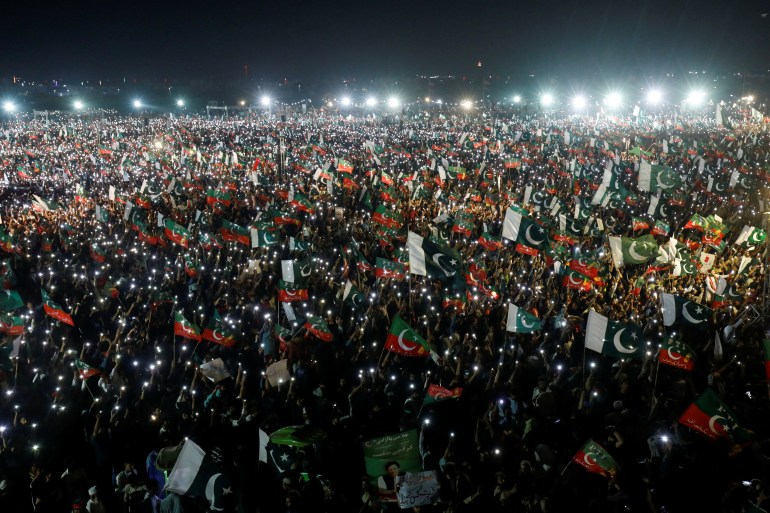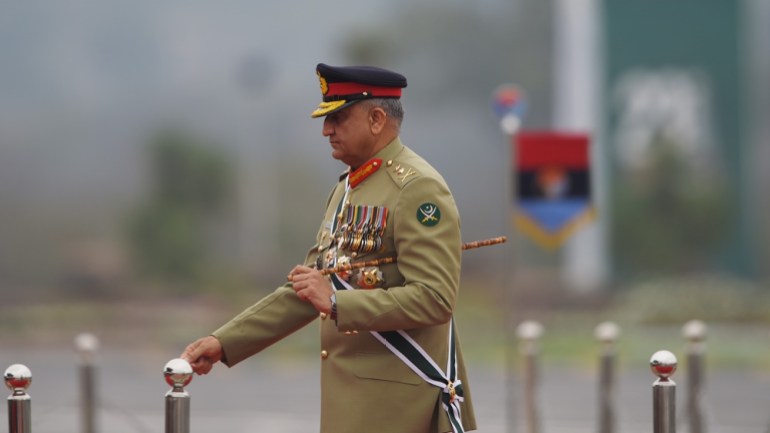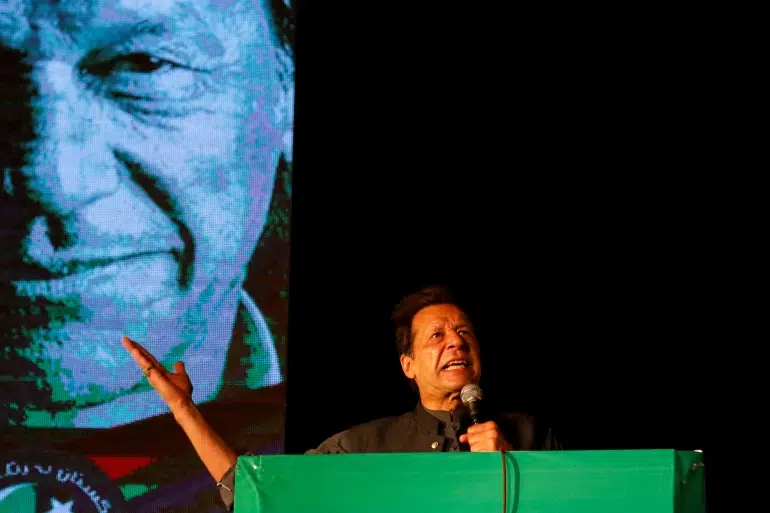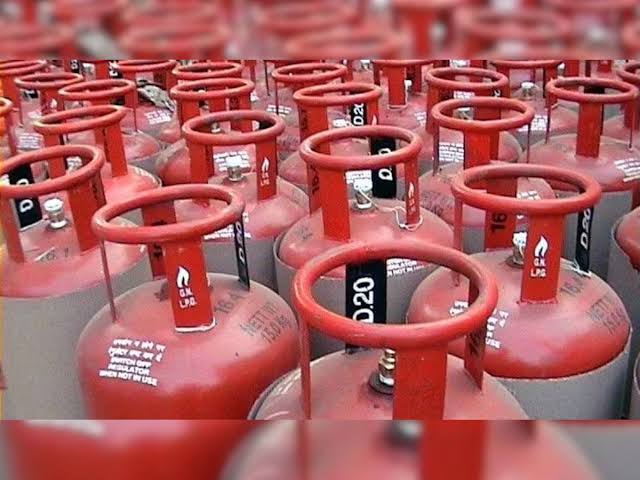As the military bristles at criticism directed at it since Khan’s exit, the ex-PM escalates his rhetoric against the powerful institution.
Islamabad, Pakistan – Imran Khan is once again trying to bend the arc of Pakistani politics to his formidable will.
Recently removed as prime minister, Khan has quickly returned to his political roots and is rallying his supporters against what he calls a rigged system.
And his supporters are responding.
At a rally in Karachi on Saturday, Khan was cheered on by a sizeable crowd as he once again laid out an alleged plot by the United States to remove him from office.
“So tell me, Pakistanis, was this a conspiracy or not, raise your hands and tell me,” Khan asked.
“Conspiracy!” the crowd roared back.

The exchange was a swipe at Pakistan’s powerful military leadership.
On Thursday, military spokesman Major-General Babar Iftikhar made national headlines, rejecting Khan’s claim the US had partnered with allies inside Pakistan to remove Khan.
The military spokesman specifically refuted the use of the word “conspiracy” by Khan, prompting the former leader’s exhortation to the crowd in Karachi.
The back and forth between Khan and the military leadership is part of a high-stakes political strategy by Khan to keep himself at the center of the national political discourse and force early elections on favorable terms.
For the cricketer-turned-politician, the risks are significant, with the military leadership bristling at the freewheeling political criticism directed at it, since his exit, at protests organised by Khan’s Pakistan Tehreek-e-Insaf (PTI) and on social media.
“Army draws its strength from people and any effort to create wedge between army and population won’t be tolerated,” army chief General Qamar Bajwa was quoted as telling his officers in a reference to unnamed “hostile forces”.
According to the Inter-Services Public Relations (ISPR), Bajwa also warned that “misinformation and propaganda threaten state integrity” and called for countering “speculations and rumours”.
Role reversal
For years, the PTI revelled in being on the “same page” as the military leadership, a claim of civil-military harmony unlike under previous civilian governments.
The PTI also routinely castigated its political opponents, particularly the Pakistan Muslim League-Nawaz (PML-N), for allegedly maligning the military leadership.
Now, it is the PML-N that is accusing Khan and his PTI of attacking the military leadership.
On Monday, Marriyum Aurangzeb, likely to be the next information minister, accused the PTI of organising a campaign on social media to “abuse institutions, promote hate speech and spread chaos in the country”.
Khan’s latest political quest, this time to regain power, is also colliding against the reality of power being consolidated by Prime Minister Shehbaz Sharif, whose government now controls parliament.
And on Saturday, amidst fisticuffs in the Punjab Assembly, Pakistan’s most populous province, power was again wrested away from Khan’s PTI.
The new chief minister of Punjab, Hamza Shahbaz, is Sharif’s son – the first such father-son duo in Pakistan’s history.
The formation of the federal cabinet may spell further consolidation, allowing the new government to pivot away from Khan and focus on its own constituencies.
So, with Khan’s next public rally in Lahore on April 21, supporters are bracing for a possible escalation in his rhetoric.
“It seems the idea is to apply pressure, to increase pressure,” Sher Ali Arbab, a PTI parliamentarian in Peshawar said of Khan’s strategy.
“But if Khan becomes more direct in referring to the establishment and the role of the judiciary, it could become a really explosive situation.”

Political tightrope
While the role of a crusading political outsider is not new to Khan, his public admonishing by the military leadership is new and the politician is walking the narrowest of tightropes.
To maintain political pressure on the new government, Khan must keep his base charged and angry. But some of that anger is directed at the military leadership, risking further alienating a powerful constituency that could still hold the keys to political power in Pakistan.
Khan’s prime ministership unravelled after the military leadership publicly distanced itself from the PTI government and assumed a posture of so-called neutrality, allowing the opposition to dislodge Khan.
Until now, Khan has carefully avoided directly blaming the military leadership for his overthrow, focusing instead on his narrative of a US plot with local facilitators.
But some of Khan’s angry supporters have been less reticent.
Videos and messages on social media have purportedly shown PTI supporters alleging military interference and manipulation against Khan.
“It is a very dangerous game,” Shuja Nawaz, author of The Battle for Pakistan: The Bitter US Friendship and a Tough Neighbourhood, told Al Jazeera.
Nawaz said the military will “protect itself as a corporate entity” from political attacks that erode its leadership’s standing with the public.
But in the upside down, topsy-turvy world of Pakistani politics where an ally turns foe and foes allies, Khan appears to have increased his support among a large cohort of influential allies: retired and serving military personnel and their extended family networks across Pakistan.

Sympathy wave
Support for Khan among the military cadres is not new. His ascent to political power in 2018 was widely popular in the military and, for years, a coterie of retired military officials vigorously defended Khan in the media and denounced his political opponents.
But retired military personnel and their families are rarely vocal in public when political power changes hands in Pakistan and strict rules guide the public conduct of serving personnel.
With Khan’s removal, however, a dam appears to have burst.
“It is surprising, certainly the extent of it is,” Ayaz Amir, retired military officer and now a political analyst, told Al Jazeera. “Why have you done this and for what purpose – not just retired but serving personnel are asking too.”






